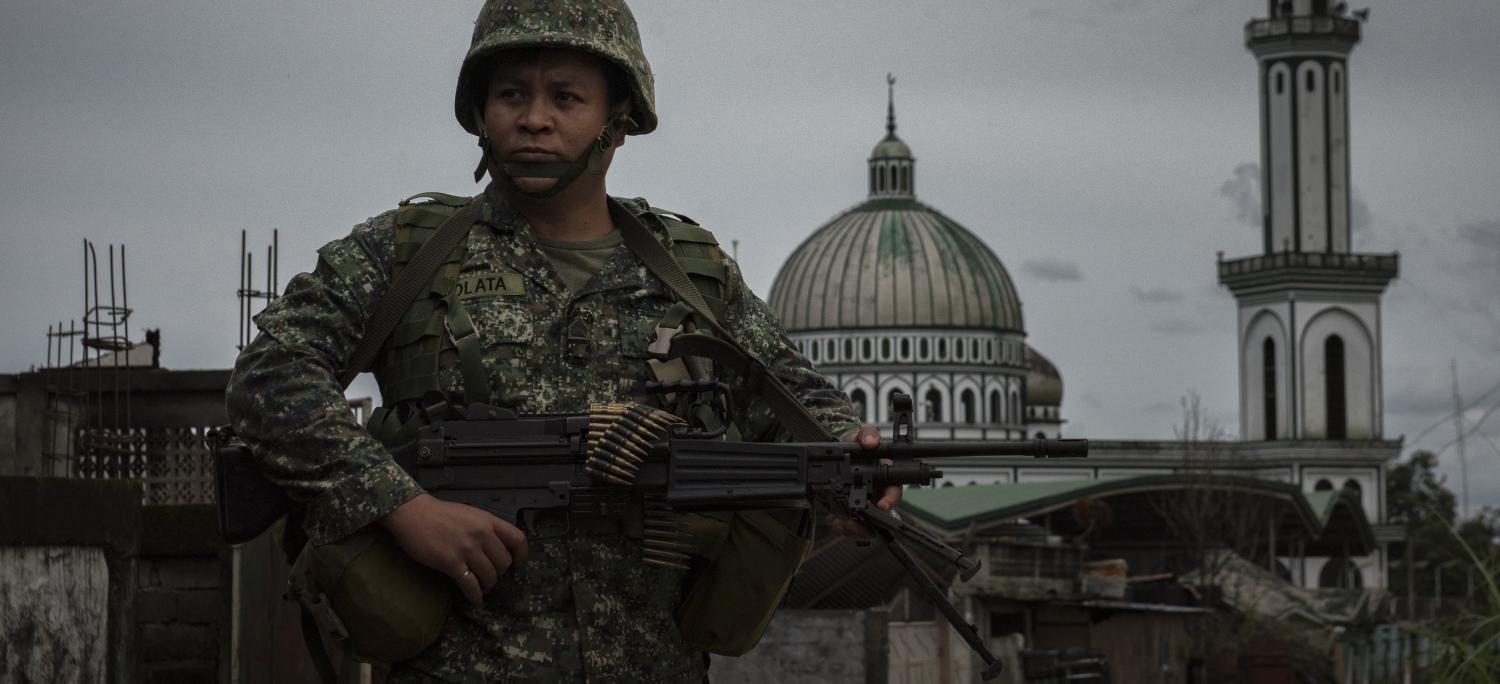The continuing conflict in the southern Philippines has engaged Australia's regional counter-terrorism interests like never before. Few predicted that the siege of Marawi, now entering its fourth month, would be so intractable or so effectively galvanise existing terrorist and insurgency groups. Marawi has evolved into a rallying cry for the ISIS-inspired in South East Asia.
The Philippine government, for its part, has been caught flat-footed. From the initial botched attempt to arrest Isnilon Hapilon to the army's lack of urban combat experience, the conflict has revealed serious capability gaps.
With the campaign to retake Marawi entering a final push, Australia should turn its mind to a long-term approach to security in Mindanao that casts forward to reconstruction, countering violent extremism and capacity building. As Sidney Jones has written, hopes for a peace settlement with insurgents in Muslim Mindanao may be dead. Getting the reconstruction right will be critical for preventing further conflict and extremism in this volatile part of the Philippines.
Australia is already contributing two Orion spy planes for intelligence gathering and $20 million in humanitarian aid. During a visit to the Philippines last week, Defence Minister Marise Payne committed to sending small contingents of Australian soldiers to train Philippine troops. So far a combat role has been ruled out, largely due to concerns that 'it would not look good' for the Philippines to invite foreigners to fight on its soil.
Prime Minister Malcolm Turnbull and Foreign Minister Julie Bishop have both declared that Marawi is 'in our region' and Australia has a vital vested interest in denying ISIS a foothold in Southeast Asia. But the strategic importance of Marawi is not just about the direct threat of terrorism. More broadly, Marawi is a tactical opportunity to deepen key regional relationships and meet global alliance commitments. Often for Australia these two imperatives conflict, but in Marawi they converge.
Australia and the United States have found common cause in supporting the Philippines in Marawi. But with the Trump Administration preoccupied with the Middle East and North Asia, Southeast Asia will struggle to occupy much of the US's bandwidth (and therefore its resources). Even if the US stays the course in Southeast Asia, Australia may be expected to shoulder more of the burden. Trump's 'America First' foreign policy asks allies to take more responsibility for their own security – Mindanao may be where Australia can pay its alliance dues closer to home.
In this context, Australia should step up as a valuable partner and engage more closely with the Philippines and with other regional players. Philippines President Rodrigo Duterte is notoriously suspicious of US interference and famously announced a separation from the old alliance to forge closer ties with China. When the US confirmed in June that it was providing assistance in Marawi, Duterte said he didn't ask for the help. The Philippines may be more comfortable quietly receiving advice and assistance from Australia – the recent visit by Australian spy chief Nick Warner is a case in point. Whatever you might think about Warner posing with the notorious Duterte, it is hard to imagine the director of the CIA receiving a similarly warm reception.
Australia is also well placed to leverage its existing counter-terrorism partnerships to coordinate a regional response, particularly with Indonesia and Malaysia, from where a handful of militants have travelled to join the fight in Marawi. Attorney-General George Brandis did some groundwork with a regional meeting on foreign fighters and cross-border terrorism held in July.
There are two areas where Australia can add substantial value to counter-terrorism and reconstruction efforts post-Marawi. The first is development in Mindanao, where Australia has a positive, decade-long track record. Education, health and peacebuilding programs in Mindanao account for more than a third of Australian aid to the Philippines. More investment in these programs, coordinated with the $14 million aid package announced by the US, will be important for facilitating returns, (re)building civil society and preventing ISIS or other extremist groups from finding easy recruits.
Second, Marawi should give new impetus for stronger defence and security ties with the Philippines. Payne's announcement that Australia would provide specialised training is a good step and aligns with priorities under the 2016 Defence White Paper and the 2015 Australia-Philippines Comprehensive Partnership. Capacity-building should include a focus on maritime cooperation in the porous border areas around Mindanao and potentially Australian support for trilateral patrols between the Philippines, Indonesia and Malaysia.
There are of course risks to Australia's deeper engagement in the southern Philippines. An obvious one is managing Duterte, the bellicose strongman whose war on drugs and comments on rape, extrajudicial killings and Barack Obama have forced countries to think twice about engaging. Despite this, Duterte remains popular domestically and will continue to lead the Philippines for the foreseeable future.
Malcolm Turnbull is yet to have his first formal meeting with Duterte. This should be rectified as soon as practicable. Getting top cover from Duterte or those close to him, such as Foreign Secretary Alan Peter Cayetano, will be crucial for avoiding any missteps. On human rights, Australia will need to fend off accusations that a long-term role in Mindanao is a tacit acceptance of the war on drugs (while also accepting that Duterte is unlikely to change course).
None of these risks outweigh the need to shore up security and stability in Mindanao, especially as the fighting in Marawi spills over. The Australian government has been communicating with the public about Australia doing more heavy lifting in the region – this was a theme of the Prime Minister's speech to the Shangri-La Dialogue in June and will probably feature in the government's upcoming Foreign Policy White Paper. Australia's role in Mindanao post-Marawi is a litmus test of its willingness and ability to do more in the immediate neighbourhood to safeguard its interests. Australia needs to pass that test.

